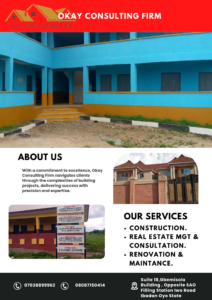How to Prepare for a Job Interview

A job interview is a meeting in which someone asks you

questions to see if you are
suitable for the job


When going for a job interview, these are the important things to work on:
Your Appearance
The way you dress for an interview gives potential employers their first impression of how you present yourself professionally. Dressing well for a job interview will also make you feel confident in yourself. Here are some tips to follow:
i. A very neat/ironed plain shirt.
ii. A trousers or a skirt
iii. Nice and moderate shoes,
iv. It’s best to avoid wearing things that are too casual like tank tops or crop tops or sneakers.
If you’re not sure what to wear to your interview, ask people who work at the place you’re being interviewed or visit the workplace to see what people who work there are wearing – assuming they don’t wear a uniform.

Interview questions to be expected
1. “Tell me a little about yourself.”
Elaborate on what you have already written in your resume and when you answer this question, connect the dots on your resume so the interviewer understands not just what you’ve done, but also why.
2. “What are your biggest weaknesses?”
Every candidate knows how to answer this question: Just pick a theoretical weakness and magically transform that flaw into a strength in disguise!
For example: “My biggest weakness is getting so absorbed in my work that I lose all track of time. Every day I look up and realize everyone has gone home! I know I should be more aware of the clock, but when I love what I’m doing I just can’t think of anything else.”
So your “biggest weakness” is that you’ll put in more hours than everyone else? Great.
3. “What are your biggest strengths?”
I’m not sure why interviewers ask this question; your resume and experience should make your strengths readily known.
Even so, if you’re asked, provide a sharp, answer. Be clear and precise. If you’re a great problem solver, don’t just say that: Provide a few examples to prove that you are a problem solver. If you’re emotionally intelligent, don’t just say that: Provide a few examples that prove you know how to answer the unasked question.
In short, don’t just claim to have certain attributes, prove you have those attributes.
4. “Where do you see yourself in five years?”
Answers to this question may be “I want your job!” Or “There are so many talented people here. I just want to do a great job and see where my talents take me.” Just let your answer be as honest as you want it to be.
In either case you learn nothing, other than possibly how well candidates can sell themselves.
5. “Out of all the candidates, why should we hire you?”
Since a candidate cannot compare himself with people he doesn’t know, all he can do is describe his incredible passion and desire and commitment and … well, basically beg for the job. (Way too many interviewers ask the question and then sit back, arms folded, as if to say, “Go ahead. I’m listening. Try to convince me.”)
6. “How did you learn about the opening?”
So don’t just explain how you heard about the opening. Show that you heard about the job through a colleague, a current employer, by following the company, show that you know about the job because you want to work there.
Employers don’t want to hire people who just want a job; they want to hire people who want a job with their company.
7. “Why do you want this job?”
Now go deeper. Don’t just talk about why the company would be great to work for; talk about how the position is a perfect fit for what you hope to accomplish, both short-term and long-term.
And if you don’t know why the position is a perfect fit, look somewhere else. Life is too short.
8.Tell me about your relationship with your former co-workers
Conflict is inevitable when a company works hard to get things done. Mistakes happens and no one is perfect.
But a person who tends to push the blame, and the responsibility for rectifying the situation, onto someone else is a candidate to avoid. Hiring managers would much rather choose candidates who focus not on blame but on addressing and fixing the problem.
Every business needs employees who willingly admit when they are wrong, step up to take ownership for fixing the problem, and, most important, learn from the experience.
9. “Describe your dream job.”
You should answer this question in a way that is relevant to the present job interview.
But that doesn’t mean you have to make up an answer. You can learn something from every job. You can develop skills in every job. Work backward: Identify things about the job you’re interviewing for that will help you if you do land your dream job someday, and then describe how those things apply to what you hope to someday do.
And don’t be afraid to admit that you might someday move on, whether to join another company or, better, to start your own business. Employers no longer expect “forever” employees.
10. “Why do you want to leave your current job?”
Don’t talk about how difficult your boss is. Don’t talk about how you can’t get along with other employees. Don’t bad-mouth your company, if you do, you are sending the wrong signal to your interviewer.
Instead, focus on the positives a move will bring. Talk about what you want to achieve. Talk about what you want to learn. Talk about ways you want to grow, about things you want to accomplish; explain how a move will be great for you and for your new company.
11. “Tell me about the toughest decision you had to make in the last six months.”
The goal of this question is to evaluate the candidate’s reasoning ability, problem-solving skills, judgment, and possibly even willingness to take intelligent risks.
Having no answer is a definite warning sign. Everyone makes tough decisions, regardless of their position like the best way to deal with a regular customer whose behavior constituted borderline harassment.
12. “Tell me about a time you disagreed with a decision. What did you do?”
No one agrees with every decision. Disagreements are fine; it’s what you do when you disagree that matters. (We all know people who love to have the “meeting after the meeting,” where they’ve supported a decision in the meeting but they then go out and undermine it.)
Show that you were professional. Show that you raised your concerns in a productive way.
Every company wants employees willing to be honest and forthright, to share concerns and issues, but to also get behind a decision and support it as if they agreed, even if they didn’t.
13. “What can we expect from you in your first three months?”
But if you’re asked, use this general framework:
i. You’ll work hard to determine how your job creates value — you won’t just stay busy, you’ll stay busy doing the right things.
ii. You’ll learn how to serve all your department, your boss, your peers, your customers, and your suppliers and vendors.
iii. You’ll focus on doing what you do best, you’ll be hired because you bring certain skills, and you’ll apply those skills to make things happen.
iv. You’ll make a difference in the best and honest way you can.
14. “What is your hobby?”
Many companies use outside interests as a way to determine how you will fit into a team so don’t be tempted to claim to enjoy hobbies you don’t. Focus on activities that indicate some sort of growth: skills you’re trying to learn, goals you’re trying to accomplish.
15. “What was your salary in your last job?”
This is a tough one. You want to be open and honest, but frankly, some companies ask the question as the opening move in salary negotiations.
Eventually, your answer might not really matter, because you’ll either accept the salary offered or you won’t, depending on what you think is fair.
NOTE:
Some employers may not bother asking you most of these questions while some may and maybe not directly. But before I let you go, I will encourage you to not just to read this column but to also pen down some of the points written here for future reference/ purpose.
I wish you all the best in your next interview.
Olubukola Olabiyi is a teacher, social media content creator, life coach, Gospel artist, and writer with focus on religion, morals, education, and motivational themes.

